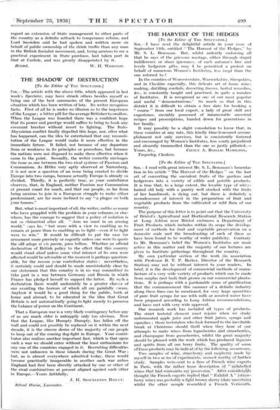THE SHADOW OF DESTRUCTION [To the Editor of THE SrEcr_vroa.]
Sra,—The article with the above title, which appeared in last week's Spectator, may have struck others besides myself as being one of the best summaries of the present European situation which has been written of late. Its writer recognises facts. First of all he is under. no illusion as to the impotence of the League ; a bitter pill for the average Britisher to swallow. Wheit the League was founded there was a confident hope that its power and prestige would suffice to bring to book any covenant breaker without resort to fighting. The .Italo- Abyssinian conflict finally dispelled this hope, nor, 'after what has happened, can the idea be entertained that any reconsti- tution of the League would make it more effective in the immediate future. It failed, not because of any departure from or weakness in its principles or procedure, but because the nations were not disposed to make these effective when it came. to the point. Secondly, the writer correctly envisages the issue as one between the two rival systems of Fascism and Communism. As Hitler very 'aptly observed at Nuremberg, it is not now a• question of an issue being created to divide Europe into two camps, because actually Europe is already so divided. Thirdly, it is perfectly true, as your contributor observes, that, in England, neither Fascism nor Communism at present count for much, and that our people, so far from being anxious to join in a European struggle to make either predominant, are far more inclined to say "a plague on both your houses."
But, what is most important of all, the writer, unlike so many who have grappled with the problem in your columns or else- where, has the courage to suggest that a policy of isolation is not so chimerical after all. " Arm we must in an arming world," Lays he, " but 'more with a view to enabling us to remain at peace than to enabling us to fight—even if to fight were to win." It would be difficult to put the case for armament more precisely or cogently unless one were to quote the ola adage si vis pacem, para helium. Whether an official declaration' of British policy to the effect that this country would stand aloof unless some vital- interest of its own were affected would be advisable at the moment is perhaps question- able, for the reason ycur contributor states : nevertheless, it certainly could and should be made unmistakably clear by our statesmen that this country isin no way committeq to take part M a war between Germany and Russia in mhiett France has pledged herself to support the latter. By myth a declaration there would undeniably be a greater charte of our avoiding the horrors of -which all are painfully :mare. Anyhow it would be a good thing for the public, both at home and abroad; to be educated in the idea that Great Britain is not automatically going to fight merely to preserve the balance of power on the Continent.
That a European war is a very likely contingency before any of us are much older is unhappily only too obvious. NoW that the League, like Humpty Dumpty, has 'fallen off the wall and-could not possibly be replaced on it within the next decade, it is the sincere desire of the majority of our people to keep out of the doming .dog-fight in Europe. ' Your cOntri- butor also realises anothef-important fact, which is that- untin such a war we should- enter without-the least enthusiasin for any one of the countries engaged in it. Recruiting difficulties were not - unknOwn in these -islands 'during the Great War ; but, as is almost everywhere admitted' today, -these would become practically insuperable- in another -such war unless England had first been directly attiteked by 'one- or other of the rival combinations at -present aligned against' each' other in Europe.—Yours S. H. SITACILIETON BAILEY.


















































 Previous page
Previous page